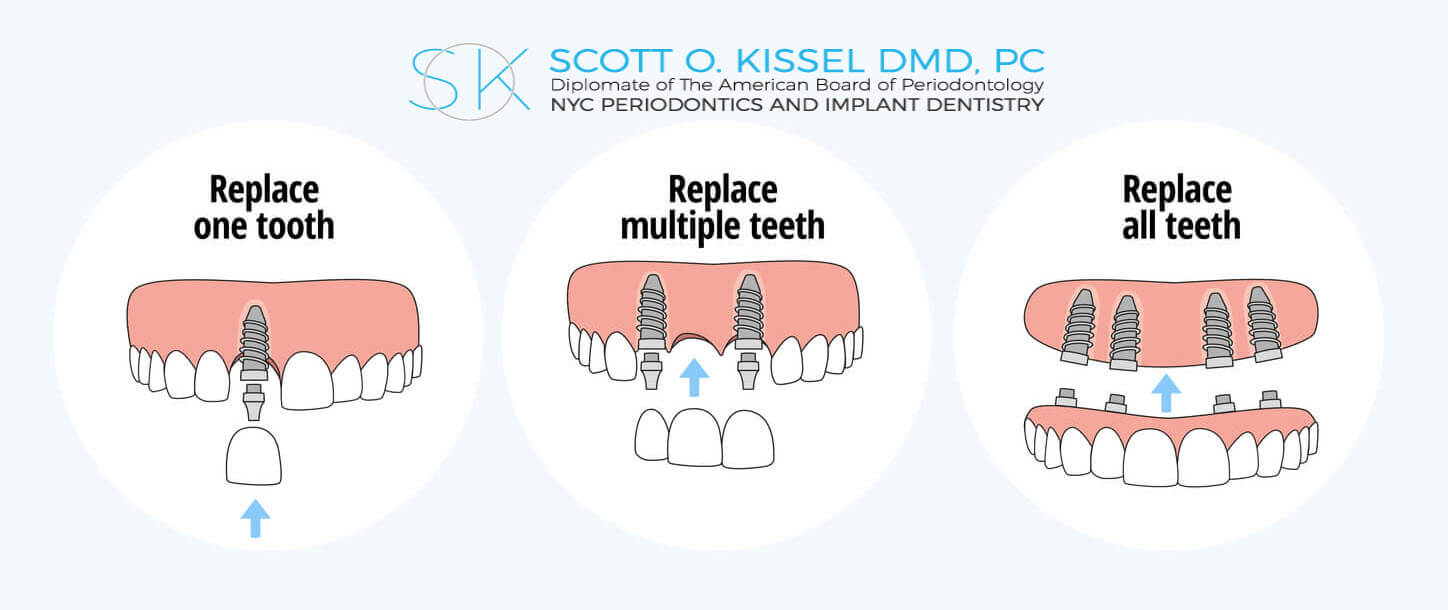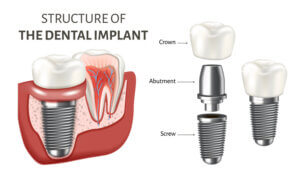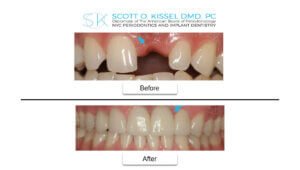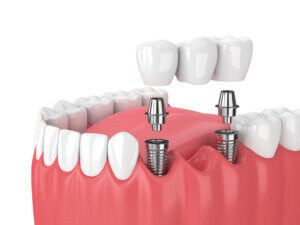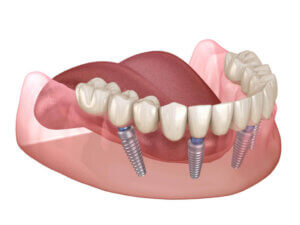Dr Scott O. Kissel has dedicated his career to restoring smiles using the most effective advanced periodontal treatments, includingdental implantology and microsurgery in Manhattan New York City. With his wealth of expertise and unwavering commitment to patient care, Dr Kissel would like to inform you about the different types of dental implants, explaining the distinction between single-tooth, multiple-teeth, and full-mouth dental implants in order to help you decide which one is right for you.
Dental Implants
Dental implants are artificial tooth roots that are surgically inserted into your jawbone. They support crowns, bridges, or dentures that replace your missing teeth. Dental implants are the most natural-looking and durable solution for tooth loss, as they mimic the function and appearance of your natural teeth.
However, not all dental implants are the same. There are different types of dental implants that suit different needs and preferences.
Single-Tooth Dental Implants
When a single tooth is beyond repair due to decay, trauma, or periodontal disease, a void is created, leaving an unsightly gap and compromising oral function. A single-tooth dental implant is ideal when you are missing only one tooth, and you want to replace it with a permanent and aesthetic solution. A single-tooth implant consists of three parts: the implant, the abutment, and the crown.
- The implant is a titanium screw that is inserted into your jawbone and acts as the artificial root of your tooth.
- The abutment is a connector that attaches the crown to the implant.
- The crown is the visible part of the implant that looks like a natural tooth.
The advantages of a single-tooth implant are:
- It preserves the health and shape of your jawbone and prevents bone loss.
- It does not affect the adjacent teeth and maintains your bite alignment.
- It is easy to clean and maintain, and does not require any special care.
- It is very durable and can last a lifetime with proper care.
Multiple-teeth dental implants
Multiple-teeth dental implants are ideal for people who are missing several teeth in a row or in different areas of the mouth. They can replace two or more teeth with a fixed or removable prosthesis that is supported by one or more implants.
There are two main types of multiple-teeth dental implants: implant-supported bridges and implant-supported dentures.
- An implant-supported bridge is a fixed prosthesis that replaces two or more adjacent teeth with artificial teeth that are connected to each other and attached to two or more implants. An implant-supported bridge is similar to a conventional bridge, except that it does not rely on your natural teeth for support.
- An implant-supported denture is a removable prosthesis that replaces a full or partial arch of teeth with artificial teeth that are attached to a metal framework or an acrylic base that snaps onto two or more implants. An implant-supported denture is similar to a conventional denture, except that it is more stable and secure.
The advantages of multiple-teeth dental implants are:
- They restore the function and appearance of your smile and improve your chewing and speaking abilities.
- They prevent the shifting and drifting of the remaining teeth and keep them in their proper position.
- They stimulate the jawbone and prevent further bone loss and facial sagging.
- They are more comfortable and natural-feeling than conventional bridges or dentures.
The Challenges of Single-Tooth And Multiple-Teeth Dental Implants
Dental implant surgery is not without challenges and complications. Some of the common problems that can occur after dental implant surgery include infection, gum recession, loose implant, nerve or tissue damage, and sinus problems. These complications can affect the success and longevity of the implant, as well as the patient’s comfort and satisfaction. Therefore, it is important to understand the risks and benefits of dental implant surgery and seek a dental implant specialist like Dr Kissel with years of experience and training in the latest microsurgical techniques. It is also highly recommended to follow the proper aftercare and maintenance instructions.
Challenges:
- They require minor surgery and a healing period of several months before the crown/prosthesis can be placed. Fortunately, Dr Kissel can perform the implant procedure using microsurgery which is minimally invasive, making the surgery and recovery time easier and faster as well as significantly reducing the risk of complications.
- They may be more expensive than other options, depending on the number of implants and the type of prosthesis. However, they can help prevent bone loss by stimulating the jawbone, they look and feel like your natural teeth, and they are more secure and offer more stability.
- It may not be suitable for people with certain medical conditions or habits that affect the healing and integration of the implant. Unfortunately, this is a difficult challenge so for some people dental implants may not be an option.
Full-Mouth Dental Implants: All-on-4
Full-mouth dental implants are ideal for people who are missing all or most of their teeth in both the upper and lower jaws. They can replace an entire set of teeth with a fixed or removable prosthesis that is supported by four or more implants per arch.
All-on-4 is a fixed prosthesis that replaces a full arch of teeth with a bridge of artificial teeth that are attached to four implants. The two back implants are strategically placed at an angle to maximize the use of the available bone and avoid the need for bone grafting. The All-on-4 prosthesis can be placed on the same day as the implant surgery, or after a few months of healing.
The advantages of full-mouth dental implants are:
- Restore the function and appearance of your smile and improve your chewing and speaking abilities.
- Prevent the loss of facial volume and structure and preserve your youthful appearance.
- Eliminate the need for adhesives, relines, or adjustments that are common with conventional dentures.
- They are more comfortable and natural-feeling than conventional dentures.
The challenges of full-mouth dental implants are:
- They require minor surgery and a healing period of several months before the final prosthesis can be placed, except for the All-on-4 immediate loading option. Dr Kissel uses 3-D surgical guides which he customizes and designs for each patient. As a result, he is able to achieve more precise accurate implant placement and avoid critical structures like nerves since they are visualized during the computer workup. The 3-D planning procedure also means that implant placement complications are reduced as well.
- Initially, they may be more expensive than other options, like dentures, but when you take into account maintenance costs such as special cleansers and adhesives and periodic adjustments, the actual cost of your dentures can add up over the years. What’s more, you may also need to replace your dentures due to damage and normal wear and tear every 5 to 15 years. On the other hand, All on 4 implants can last a lifetime. In addition, All on 4 can offer you a higher quality of life than dentures helping you feel much more confident when eating or smiling.
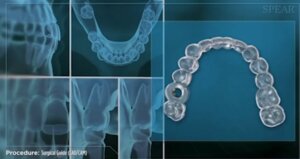
How to Choose the Most Suitable Types of Dental Implants for You?
Dental implants are a great way to replace missing teeth and restore your smile and your confidence. However, choosing the right types of dental implants for your situation can be challenging. That is why you need the guidance and expertise of a qualified and experienced periodontist and dental implant specialist like Dr. Kissel.
Dr. Kissel is a board-certified periodontist with advanced training in dental implants, laser surgery, and microscopic procedures. He has over 25 years of experience in providing personalized, long-term solutions for any dental implant needs and periodontal issues.
Dr. Kissel will evaluate your oral health, bone density, and aesthetic goals and recommend the best types of dental implants for you. He will also explain the procedure, the risks, the benefits, and the costs of each option and answer any questions you may have.
If you are ready to take the first step towards a beautiful and healthy smile, contact Dr Kissel today and book a dental implant consultation with him. Call Dr. Kissel at (212) 702-9088 or book your consultation online. You deserve the best dental care possible, and Dr Kissel is here to provide it.
